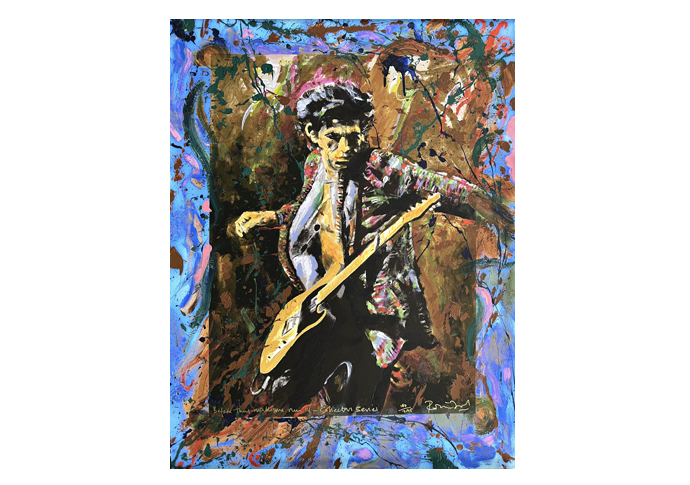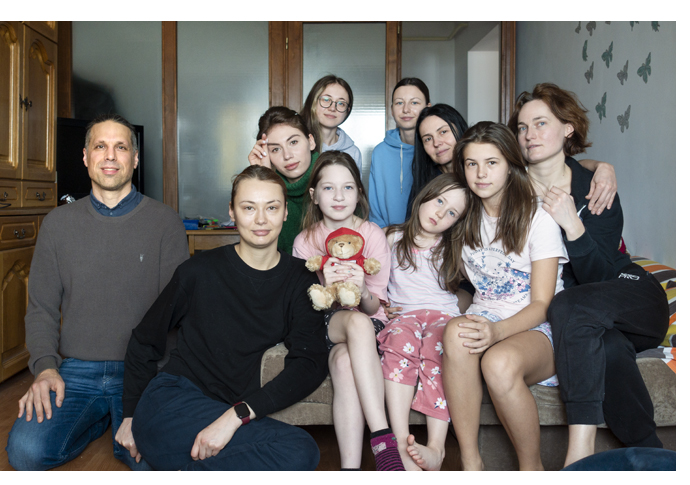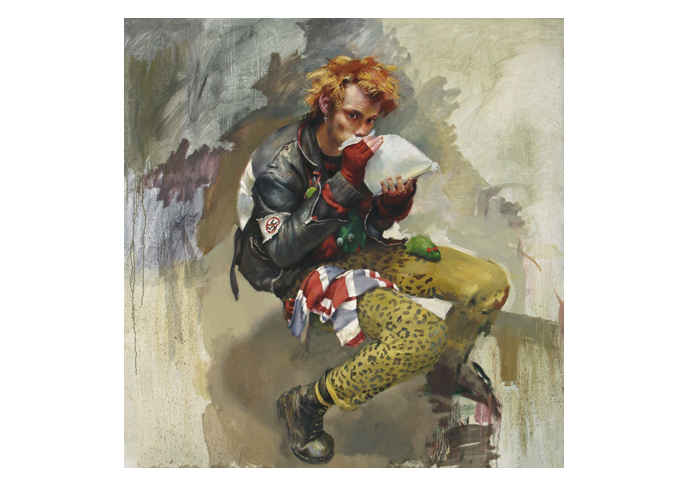The art of war
An art auction aims to raise more funds for vital medicine for those in war-torn Ukraine. Galina Lakiza tells Dan Carrier what the Russian invasion has done to her home town
Thursday, 31st October 2024 — By Dan Carrier

Ronnie Wood’s Before They Make Me Run
THE Ukrainian town of Bucha is a Kyiv satellite. Think of London’s relationship to Crawley, Beaconsfield, St Albans or Billericay.
But Bucha today is a town haunted by the nightmare of state-sponsored murder, and is at the centre of an investigation into war crimes.
A mass grave has been discovered holding 500 bodies; Russian troops stand accused of committing atrocities.
For Vladimir Putin’s generals, Bucha wasn’t a nondescript town of little value. Its close proximity to an airport meant it was a prime target when the war started – and would have terrible impact on the people who live there.
Galina Lakiza and her two daughters are today safe in Tufnell Park after they managed to escape oncoming Russian forces at the last moment, helped by Galina’s sister, Lesia, who is married to Kentish Town-born Adam Parker.
The family have watched their home town become a battleground, and have had to leave their parents and Galina’s husband behind.
Understandably, the sisters were determined to help and have established a charity, Art Aid Ukraine. The scheme sells works of art and has now raised £100,000 to buy vital medicine.
In December they are hosting their second show and the family have told Review why the need to help those injured in Ukraine remains as vital today as it did when the war began.
On day one of the invasion, Adam and Lesia flew to Romania. They watched the borders fill with desperate refugees.
“I was so distraught,” says Lesia. “I immediately went out there, got as close as we could to give them a place to aim for. It was hard to persuade them to go.

Group photo at the Suceava apartment
“Many did not believe this would happen, and when it did, they then thought it would not be so bad. Many felt the Russians would get through to Kyiv and then there would be a long guerilla war.”
Galina experienced the war first hand. “The Russians sent their special forces right by home,” she says. “There was ferocious fighting all around us. This insignificant town of ours became the front line . They needed to take the airport to bring in the troops to take the city.
“The town reacted. They were handing out guns, giving the local plumber a rifle and Molotov cocktails to fight the Russian special forces – and the amazing thing is they managed to. It got so bad for the Russians they sent in the dreaded Chechen troops.”
Galina was worried for the safety of her children and on the first nights of the invasion they hid in the basement of their home and she armed herself with an axe. She left with her daughters, aged six and eight, saying a tearful goodbye to her husband, who remains there.
They set off across a war-scarred and frozen landscape.
“I grabbed some duvets and food but we did not get to take anything from our house, we did not have the time. A neighbour offered to look after our cat and dog.”
The weight of traffic and numerous check points meant they managed to travel just 100 kilometres in one day and it would become a torrid three days to reach the Romanian border.
“It was scary to watch,” says Adam. “There were queues for days on end and terrible weather at night.
“There were people walking through minus 10 conditions. There was no fuel. There were massive problems simply making sure there was enough food.
“From our side, we had to find which crossings were safe. We built up incredible networks quickly – people wanted to help strangers.
“The Romanian people were exceptional. They came out and helped.”
As Galina drove into the unknown, she had to deal with knowing her parents had chosen to stay behind.
“They felt it could not last,” she says. “By the second day, I had friends begging me to leave – they had heard dreaded Chechen fighters were attacking. I said to my mum that we really must leave right now but my dad just wouldn’t. My mother had experienced Chernobyl and took us away to escape the disaster. She said ‘take your children and go’.”
It meant their parents experienced life under Russian control.

Syd Sniffing Glue by Robert Lenkiewicz
“Our parents were there when Bucha fell. They saw truly terrible things,” says Galina. “My dad had found an empty shop with food, so he shared it with neighbours.
“It was awful. People were going on their bikes to look for food and getting shot by Russian troops.
“It was really dangerous to leave your house. People had tanks parked in their front gardens. For two weeks, they watched the Russians fighting their way through the streets. The electricity was cut, there was no one they could ask for help or information from.”
Eventually, her parents did escape during ferocious fighting and spent five months in Portugal. But the call of home was strong and when Ukrainian troops had driven out the invaders, they went back to Bucha, where they remain today.
Galina, Lesia and Adam spent time in Romania while they worked setting up supply lines to Ukrainian medical centres.
“Lesia was working on the visas and I felt a bit of a spare part, so I went to the border and took bits and pieces,” says Adam.
“We had a lot of offers for help, people asking what could we do
“We said we are buying as much medicine as possible. Our friend worked in a hospital in Dinop and knew what was needed.
“They would call us and say ‘we need antiseptics’ for example. People were going to pharmacies, buying all they could and sending it over the border with volunteers. The need obviously shot through the roof. The supply chains were disrupted.
“The volunteers were incredible – they helped plug the gaps. We were introduced to the Sange Pentru charity, who were getting items across the border without any questions being asked.
“I went to every pharmacy I could and used my credit card to buy whatever they had.”
Adam persuaded a wholesaler to supply medical aid at cost.
“We set up the logistics to link delivery drivers up, so we could track where the medicines were going,” he said.
“In the early days, there was a lot of chaos but we got a really good reliable system together.”
Adam is a member of the Association of Photographers and members suggested a print sale.
The next show includes donations by big names. Contributions include the Robert Lenkiewicz Foundation, Rolling Stone Ronnie Wood, Laura Price, Abi Carolan, Nicole Farhi, Matt Small and the Connor Brothers.
With the war continuing, the need has not gone away.
“The terrible thing is always wondering what happens next,” adds Galina. “If the war was over tomorrow, I would return home. But it is so dangerous.
“We used to go to the forest for picnics. Today it is full of landmines. Our town is wrecked. There are unexploded bombs all over the place.
“This is such a bad situation so what can you do but try to do something positive?
“Every bandage we send may save a life. Every medicine might ease some pain.”
• Art Auction Ukraine, December 1, Old Hampstead Town Hall, Haverstock Hill, NW3. Doors open 3.30pm, auction 6.30pm. https://www.artaidukraine.com/